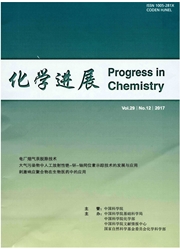

 中文摘要:
中文摘要:
随着纳米科学的迅速发展,越来越多的微粒材料被设计和制备出来,并应用于生物医学领域,取得了令人瞩目的进展和成就。近年来,我们课题组发展了一系列具备可控表面化学与结构、特定刺激响应性能和可控装载与释放性能的微粒材料,尤其是基于层层自组装的中空微胶囊。同时,我们也致力于研究微粒材料与细胞的相互作用,阐明其物理化学性质对细胞内吞和细胞功能的影响。通过这些研究,我们希望进一步建立功能性微粒材料的生物学功能优化的规律,推动其在生物医学领域的应用。
 英文摘要:
英文摘要:
Along with the rapid development of micro and nanotechnology, the colloidal particles are taking more and more important roles in biological field as detective probes for disease diagnosis and drug carriers for sustained release and targeted delivery. On one hand, to fulfill the demands of these biological applications, various novel particulate materials with finely tuned surface chemistry and morphology, well defined stimuli responsiveness as well as adjustable substance loading and release properties have been developed in our lab. On the other hand, efforts are made to understand the cellular uptake of particles, and thereby the influence on cell functions, which is mandatory for their biomedical applications. In this mini-account, we systematically summarize our efforts to prepare and functionalize the particulate materials, especially the hollow microcapsules fabricated by the layer-by-layer (LbL) assembly of oppositely charged polyelectrolytes on colloidal templates, followed by core removal. The influences of physiochemical properties of these colloidal particles on the cellular uptake, intracellular distribution and transportation are then introduced. Their impacts on cytotoxicity and subsequent cell functions, especially on cell mobility and phenotype, are also discussed.
 同期刊论文项目
同期刊论文项目
 同项目期刊论文
同项目期刊论文
 Biological hydrogel synthesized from hyaluronic acid, gelatin and chondroitin sulfate by click chemi
Biological hydrogel synthesized from hyaluronic acid, gelatin and chondroitin sulfate by click chemi Modulating the Structure and Properties of Poly(sodium 4-styrenesulfonate)/Poly(diallyldimethylammon
Modulating the Structure and Properties of Poly(sodium 4-styrenesulfonate)/Poly(diallyldimethylammon High efficient loading and controlled release of low-molecular-weight drugs by combination of sponta
High efficient loading and controlled release of low-molecular-weight drugs by combination of sponta Hybrid calcium phosphate coatings with the addition of trace elements and polyaspartic acid by a low
Hybrid calcium phosphate coatings with the addition of trace elements and polyaspartic acid by a low Poly(lactide-co-glycolide)/hydroxyapatite nanofibrous scaffolds fabricated by electrospinning for bo
Poly(lactide-co-glycolide)/hydroxyapatite nanofibrous scaffolds fabricated by electrospinning for bo Influence of assembly pH on compression and Ag nanoparticle synthesis of polyelectrolyte multilayers
Influence of assembly pH on compression and Ag nanoparticle synthesis of polyelectrolyte multilayers A HYBRID SCAFFOLD OF POLY(LACTIDE-CO-GLYCOLIDE) SPONGE FILLED WITH FIBRIN GEL FOR CARTILAGE TISSUE E
A HYBRID SCAFFOLD OF POLY(LACTIDE-CO-GLYCOLIDE) SPONGE FILLED WITH FIBRIN GEL FOR CARTILAGE TISSUE E The restoration of full-thickness cartilage defects with BMSCs and TGF-beta 1 loaded PLGA/fibrin gel
The restoration of full-thickness cartilage defects with BMSCs and TGF-beta 1 loaded PLGA/fibrin gel Enhanced angiogenesis of gene-activated dermal equivalent for treatment of full thickness incisional
Enhanced angiogenesis of gene-activated dermal equivalent for treatment of full thickness incisional Control over the Gradient Differentiation of Rat BMSCs on a PCL Membrane with Surface-Immobilized Al
Control over the Gradient Differentiation of Rat BMSCs on a PCL Membrane with Surface-Immobilized Al Influence of structure and properties of colloidal biomaterials on cellular uptake and cell function
Influence of structure and properties of colloidal biomaterials on cellular uptake and cell function Preparation of polycaprolactone microspheres-aggregated scaffold with ultra big pores and fuzzy sphe
Preparation of polycaprolactone microspheres-aggregated scaffold with ultra big pores and fuzzy sphe Directional migration of vascular smooth muscle cells guided by synergetic surface gradient and chem
Directional migration of vascular smooth muscle cells guided by synergetic surface gradient and chem Fabrication of poly(lactide-co-glycolide) scaffold filled with fibrin gel, mesenchymal stem cells, a
Fabrication of poly(lactide-co-glycolide) scaffold filled with fibrin gel, mesenchymal stem cells, a Unidirectional migration of single smooth muscle cells under the synergetic effects of gradient swel
Unidirectional migration of single smooth muscle cells under the synergetic effects of gradient swel Biomimetic preparation of biomimetic trace elements-codoped calcium phosphate for promoting osteopor
Biomimetic preparation of biomimetic trace elements-codoped calcium phosphate for promoting osteopor Enhancement of osteogenesis by poly(lactide-co-glycolide) sponges loaded with surface-embedded hydro
Enhancement of osteogenesis by poly(lactide-co-glycolide) sponges loaded with surface-embedded hydro Mineralization of Collagen-Coated Electrospun Poly(lactide-co-glycolide) Nanofibrous Mesh to Enhance
Mineralization of Collagen-Coated Electrospun Poly(lactide-co-glycolide) Nanofibrous Mesh to Enhance Restoration of rat calvarial defects by poly(lactide-co-glycolide)/hydroxyapatite scaffolds loaded w
Restoration of rat calvarial defects by poly(lactide-co-glycolide)/hydroxyapatite scaffolds loaded w Preparation and Redox-Controlled Reversible Response of Ferrocene-Modified Poly(allylamine hydrochlo
Preparation and Redox-Controlled Reversible Response of Ferrocene-Modified Poly(allylamine hydrochlo Controlling the migration behaviors of vascular smooth muscle cells by methoxy poly(ethylene glycol)
Controlling the migration behaviors of vascular smooth muscle cells by methoxy poly(ethylene glycol) Directional cell migration through cellecell interaction on polyelectrolyte multilayers with swellin
Directional cell migration through cellecell interaction on polyelectrolyte multilayers with swellin Cellular Uptake of Covalent Poly(allylaminehydrochloride) Microcapsules and Its Influences on Cell F
Cellular Uptake of Covalent Poly(allylaminehydrochloride) Microcapsules and Its Influences on Cell F Influences of surface chemistry and swelling of salt-treated polyelectrolyte multilayers on migratio
Influences of surface chemistry and swelling of salt-treated polyelectrolyte multilayers on migratio Facile fabrication of the glutaraldehyde cross-linked collagen/chitosan porous scaffold for skin tis
Facile fabrication of the glutaraldehyde cross-linked collagen/chitosan porous scaffold for skin tis RNAi functionalized collagen-chitosan/silicone membrane bilayer dermal equivalent for full-thickness
RNAi functionalized collagen-chitosan/silicone membrane bilayer dermal equivalent for full-thickness Directional Migration of Vascular Smooth Muscle Cells Guided by a Molecule Weight Gradient of Poly(2
Directional Migration of Vascular Smooth Muscle Cells Guided by a Molecule Weight Gradient of Poly(2 期刊信息
期刊信息
